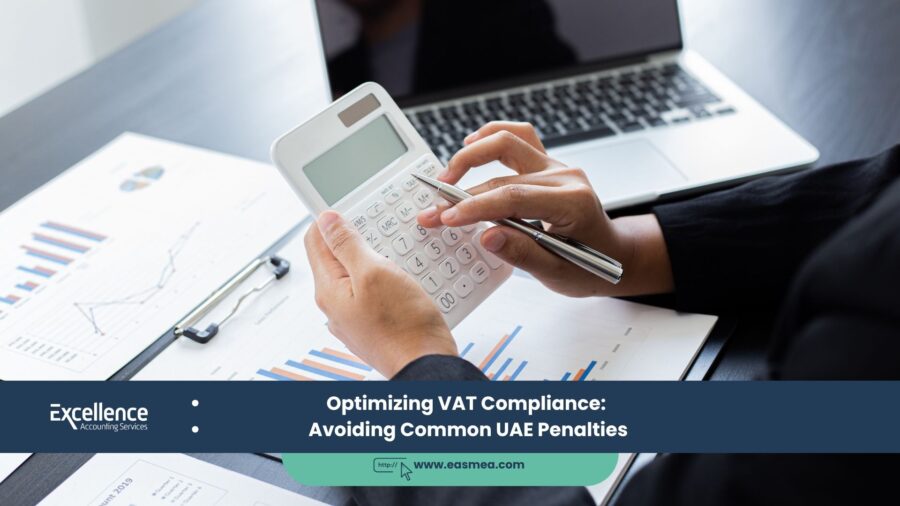Optimizing VAT Compliance: Avoiding Common UAE Penalties
Since its introduction in 2018, Value Added Tax (VAT) has become an integral part of the UAE’s commercial landscape. While most businesses have adapted to the mechanics of charging and remitting VAT, the risk of non-compliance remains a significant financial threat. The Federal Tax Authority (FTA) has established a robust framework of penalties designed to enforce accuracy and timeliness, and even minor, unintentional errors can result in substantial financial liabilities that erode profitability. Navigating this landscape requires more than just basic bookkeeping; it demands a proactive and optimized approach to VAT compliance.
- Optimizing VAT Compliance: Avoiding Common UAE Penalties
- Understanding the Landscape: Common VAT Penalties in the UAE
- Deep Dive: The Root Causes of VAT Errors and How to Fix Them
- Leveraging Technology for Watertight VAT Compliance
- What Excellence Accounting Services (EAS) Can Offer
- Frequently Asked Questions (FAQs)
- Secure Your Business Against VAT Penalties.
This guide is designed to move your business from a reactive to a proactive stance on VAT. We will dissect the most common errors that lead to penalties, from incorrect calculations and late filings to record-keeping failures and misinterpretations of the law. More importantly, we will provide a strategic framework for optimizing your processes, leveraging technology, and embedding best practices into your daily operations. The goal is to transform VAT compliance from a source of anxiety into a streamlined, efficient, and risk-free component of your financial management system.
Key Takeaways for VAT Compliance
- Penalties are Severe: The FTA imposes significant fixed and percentage-based penalties for a wide range of violations, impacting cash flow and profitability.
- Record-Keeping is Non-Negotiable: Failure to maintain accurate and complete records for at least five years is a primary cause of non-compliance and penalties during a tax audit.
- Technology is an Ally: Modern, FTA-accredited accounting software is essential for minimizing human error, ensuring accurate calculations, and generating compliant reports.
- Proactive Reviews are Crucial: Regular internal VAT health checks can identify and rectify errors before they become major liabilities.
- Expert Guidance is an Investment: The complexity of VAT law, especially concerning input tax recovery and special schemes, often requires professional guidance to avoid costly mistakes.
Understanding the Landscape: Common VAT Penalties in the UAE
The FTA’s penalty regime is comprehensive. It’s crucial for businesses to be aware of the specific violations and their financial consequences. Ignorance of the law is not considered a valid defense.
| Violation | Penalty Details | Operational Risk Factor |
|---|---|---|
| Failure to Register for VAT on Time | AED 10,000 | Businesses experiencing rapid growth may cross the mandatory registration threshold (AED 375,000 in taxable supplies) without realizing it. |
| Late Filing of a VAT Return | AED 1,000 for the first offense, AED 2,000 for a subsequent offense within 24 months. | Poor internal deadlines, reliance on single individuals, and inefficient data collection processes. |
| Late Payment of VAT Due | – 2% of unpaid tax due immediately. – 4% due on the 7th day after the deadline. – 1% daily penalty (capped at 300%) one month after the deadline. | Inaccurate cash flow forecasting and weak accounts receivable management, leading to a lack of funds at the payment deadline. |
| Filing an Incorrect Tax Return | – Fixed penalty of AED 3,000 (or AED 5,000 for repeat offenses). – Percentage-based penalty based on the tax understatement, which can be up to 50%. | Manual calculations, incorrect classification of supplies (e.g., zero-rated vs. exempt), and errors in input tax recovery claims. |
| Failure to Keep Required Records | AED 10,000 for the first offense, AED 50,000 for repeat offenses. | Using basic spreadsheets instead of a proper accounting system; failing to store invoices, credit notes, and import/export documents. |
| Failure to Issue a Tax Invoice/Credit Note | AED 5,000 per missing or incorrect document. | Inadequate invoicing software, lack of staff training on the mandatory components of a tax invoice. |
These penalties highlight that VAT compliance is a chain of interconnected processes. A failure in one area, such as record-keeping, inevitably leads to failures in others, like filing an incorrect return, creating a cascade of potential penalties.
Deep Dive: The Root Causes of VAT Errors and How to Fix Them
Avoiding penalties requires understanding the operational weaknesses where errors originate.
1. Incorrect Input Tax Recovery
One of the most complex areas of VAT is claiming input tax (the VAT you pay on your business expenses). Over-claiming is a common error that leads to penalties upon audit.
- The Problem: Businesses mistakenly claim VAT on blocked items like certain entertainment expenses, or on expenses not used for making taxable supplies (e.g., costs related to making exempt supplies).
- The Solution: Your chart of accounts must be structured to segregate expenses. For example, have a separate account for “Blocked Entertainment” where input tax is not claimed. Regular account reconciliation and review by a knowledgeable professional is essential. This requires a robust accounting and bookkeeping function.
2. Misclassification of Supplies
The distinction between standard-rated (5%), zero-rated, exempt, and out-of-scope supplies is critical but often misunderstood.
- The Problem: Incorrectly treating a standard-rated supply as zero-rated means you under-declare your output tax. Conversely, treating an exempt supply as zero-rated could lead you to incorrectly recover related input tax.
- The Solution: Create a ‘VAT treatment matrix’ for all your revenue streams. This document should be reviewed and updated regularly. Staff involved in sales and invoicing must be trained to apply the correct VAT rate. For complex cases, seeking advice from VAT consultants is a prudent investment.
3. Poor Record-Keeping and Documentation
The foundation of any defensible tax position is documentation. The FTA can disallow an input tax claim if you do not hold a valid tax invoice for the expense.
- The Problem: Missing invoices, invoices that don’t meet the legal requirements (e.g., missing TRN), and failure to maintain records for the mandatory five-year period.
- The Solution: Implement a digital-first document management policy. Use an accounting system that allows you to attach scanned copies of invoices to each transaction. Your accounts payable team must have a checklist to verify the validity of supplier invoices before processing payment.
Leveraging Technology for Watertight VAT Compliance
In the digital age, manual VAT management is an unnecessary risk. Technology, specifically FTA-accredited accounting software, is the most powerful tool for optimizing compliance.
A platform like Zoho Books is built for the UAE’s tax environment. It automates critical processes, significantly reducing the risk of human error that leads to penalties.
- Automated Tax Calculations: It automatically calculates the VAT on each invoice and bill based on the tax rate you assign, eliminating manual math errors.
- FTA Audit File Generation: Zoho Books can generate the FTA Audit File (FAF) at the click of a button, ensuring you are always prepared for an audit.
- Real-time Reporting: It generates your VAT return figures in real-time, allowing you to review and verify your liability well before the filing deadline.
- Centralized Record-Keeping: It acts as a central repository for all your financial records, including tax invoices, ensuring you meet your legal obligations.
A proper accounting system implementation is key to unlocking these benefits and ensuring the software is configured correctly for your specific business needs.
What Excellence Accounting Services (EAS) Can Offer
Optimizing VAT compliance is an ongoing process that benefits from expert oversight. At EAS, we provide end-to-end VAT services designed to protect your business from penalties and enhance efficiency.
- VAT Health Check & Diagnostic Review: Our experts conduct a thorough internal audit of your past VAT returns and processes to identify historical errors and areas of future risk. We provide a clear report on findings and remedial actions.
- Comprehensive VAT Return Filing: We manage the entire process of preparing and filing your periodic VAT returns, ensuring accuracy, timeliness, and maximization of legitimate input tax recovery.
- VAT Registration & De-registration: We handle the entire process of VAT registration and de-registration, ensuring all deadlines and documentation requirements are met.
- FTA Audit Assistance: In the event of an FTA audit, we act as your representative, preparing all required documentation and managing communication with the authority to ensure a smooth process.
- Strategic VAT Consultancy: For complex transactions, cross-border services, or business restructuring, our VAT consultants in Dubai provide strategic advice to ensure compliance and optimize your VAT position.
Frequently Asked Questions (FAQs)
No, this is a risky strategy. The FTA encourages voluntary disclosure. If you discover an error that resulted in a tax understatement of more than AED 10,000, you are legally required to submit a voluntary disclosure within 20 business days. Doing so can lead to reduced penalties compared to the FTA discovering the error during an audit. Proactively managing this with expert help is the best approach.
The Reverse Charge Mechanism (RCM) applies when you import goods or services from outside the UAE. Instead of the supplier charging you VAT, you, the recipient, must account for the VAT yourself. You declare the output tax on your return and simultaneously claim it as input tax (if eligible). A common error is failing to account for output tax under RCM, leading to an understatement of tax due and significant penalties.
The FTA has a process for penalty reconsideration. You can submit a request if you have a valid reason, such as a demonstrable technical issue with the FTA portal or a genuine, well-documented misunderstanding. However, simply stating the error was “unintentional” is generally not sufficient. You need to provide strong evidence and justification. The success of such applications often depends on the quality and clarity of the submission.
The standard requirement is to keep all business records, including invoices, credit notes, ledgers, and import/export documents, for a minimum of five years after the end of the tax period they relate to. For businesses in the real estate sector, the record retention period is extended to 15 years. This is a strict legal requirement with its own specific penalties if breached.
Yes. Even if your net tax liability is always zero, you still have full compliance obligations. You must be registered for VAT (if you meet the threshold), file regular VAT returns by the deadline, and maintain all required records. Failure to file a “nil” return on time will still result in the standard late filing penalty of AED 1,000.
A tax invoice must contain specific information. Common errors include: omitting the words “Tax Invoice,” failing to show the supplier’s Tax Registration Number (TRN), not showing the amount of tax for each line item, or not stating the tax-inclusive price. The FTA can disallow input tax recovery for your customer if your invoice is invalid, and you can be penalized for issuing incorrect documents.
This is a technical but crucial distinction. ‘Exempt’ supplies are specified in the law (e.g., certain financial services, bare land). You do not charge VAT on them, and you cannot recover the input tax on costs related to them. ‘Out of scope’ supplies are those that are not considered to be made in the UAE for VAT purposes (e.g., a sale between two companies outside the UAE). No UAE VAT is due, and it doesn’t impact your input tax recovery in the same way. Misclassifying these can lead to major errors in your return.
Ultimately, you, the importer of record, are responsible for maintaining the correct import documentation (e.g., customs declarations) to support your input tax claim on the import VAT. While your 3PL or freight forwarder will handle the process, you must have a system to obtain and store copies of all these official documents. Relying on the agent to keep them is not a compliant practice.
Yes, you can. However, the tax invoice must clearly distinguish between the different types of supplies. You must show each line item, the applicable VAT rate for each, and the amount of VAT charged for each. The invoice should have a clear subtotal for the standard-rated items and the corresponding VAT amount, as well as a subtotal for the zero-rated items.
Good VAT compliance builds the foundation for good Corporate Tax compliance. The meticulous record-keeping, accurate financial data, and robust accounting systems required for VAT are the same systems you will rely on for calculating your taxable income for Corporate Tax. Furthermore, the VAT declared in your returns must reconcile with the revenue reported in your financial statements. Any discrepancies will be a major red flag for the FTA. A service that offers both VAT consultancy and Corporate Tax services can ensure a holistic and consistent approach.
Conclusion: Proactive Compliance as a Business Asset
In the UAE’s tax landscape, compliance is not a passive obligation; it is an active business function. By investing in the right technology, processes, and expert advice, you can transform VAT management from a high-risk burden into a smooth, efficient, and penalty-free operation. This proactive approach not only protects your bottom line from unforeseen liabilities but also strengthens your overall financial governance, making your business more resilient and better prepared for future growth.




